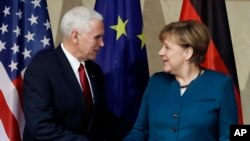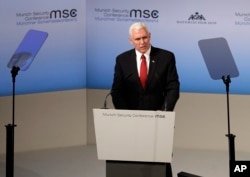While German Chancellor Angela Merkel proposed that European nations strengthen their multilateral ties, U.S. Vice President Mike Pence praised NATO but made no mention of the European Union, fueling concerns about America’s new approach to international affairs.
At the Munich Security Conference Saturday, Merkel delivered a speech stressing the importance of supporting organizations such as the European Union, the United Nations and NATO that have played key roles in the post-Cold War global order.
"Will we be able to continue working well together, or will we all fall back into our individual roles?" Merkel asked. "I call on us, and I hope we all find common ground on this, let's make the world better together and then things will get better for every single one of us."
Like Merkel, Pence expressed support for NATO and sought to address concerns raised by U.S. President Donald Trump, who once said the military alliance was "obsolete."
"The United States of America strongly supports NATO and will be unwavering in our commitment to our transatlantic alliance," Pence said in his first major foreign policy address for the new administration.
Although Pence made no mention of the European Union, he will have the opportunity to explain the Trump administration’s position on the 28-nation alliance when he meets with EU leaders Sunday in Brussels.
US ‘will always be your greatest ally’
Pence also sought to reduce speculation that Trump would abandon guarantees that European nations believe the U.S. would protect them from Russia.
“Today, tomorrow, and every day hence, be confident that the United States is now and will always be your greatest ally,” he said.
Pence promised the U.S. would "hold Russia accountable" amid European concerns about Russian aggression and as Trump searches for new areas of interest with Moscow. Pence said Russia must honor a 2015 peace agreement to end the fighting in eastern Ukraine between government forces and Russia-backed separatists.
Shortly after Pence's address, Russian Foreign Minister Sergei Lavrov called for an end to the world order dominated by Western nations since the end of the Cold War.
"I hope that [the world] will choose a democratic world order, a post-West one, in which each country is defined by its sovereignty," Lavrov said.
Lavrov later said Russia wanted to build a relationship with the U.S. that would be "pragmatic with mutual respect and acknowledgement of our responsibility for global stability."
Lavrov mentioned that the U.S. and Russia have never engaged in direct conflict, and even noted the two countries were close neighbors across the Bering Strait.
Merkel and Pence met on the sidelines of the security conference following their speeches. The two leaders committed to cooperate on a “wide range of global challenges” and discussed the need for NATO allies to meet what a White House statement called “burden-sharing commitments” in order to effectively deal with “21st century threats."
Before leaving Munich for Brussels Sunday, Pence was expected to meet with leaders of countries that have the most to lose or gain from any new agreements between the U.S. and Russia. The countries include Afghanistan, Iraq, Estonia, Latvia, Lithuania, Ukraine, and Turkey.






